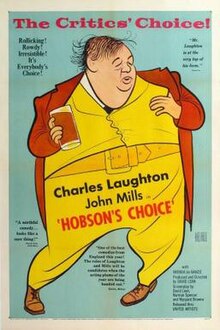Hobson's Choice (1954 film)
| Hobson's Choice | |
|---|---|

Theatrical release poster
|
|
| Directed by | David Lean |
| Produced by | David Lean |
| Written by |
Harold Brighouse Wynyard Browne David Lean Norman Spencer |
| Starring |
Charles Laughton Brenda De Banzie John Mills Daphne Anderson Prunella Scales |
| Music by | Malcolm Arnold |
| Cinematography | Jack Hildyard |
| Edited by | Peter Taylor |
| Distributed by |
British Lion Films London Films United Artists |
|
Release date
|
19 April 1954 (UK) 14 June 1954 (US) |
|
Running time
|
107 minutes |
| Country | United Kingdom |
| Language | English |
| Box office | £206,579 (UK) |
Hobson's Choice is a 1954 romantic comedy film directed by David Lean. It is based on the play of the same name by Harold Brighouse. It stars Charles Laughton in the role of Victorian bootmaker Henry Hobson, Brenda De Banzie as his eldest daughter and John Mills as a timid employee. The film also features Prunella Scales in one of her first cinema roles as Vickey.
Hobson's Choice won the British Academy Film Award for Best British Film 1954.
Willie Mossop (John Mills) is a gifted but unappreciated bootmaker employed by the tyrannical Henry Horatio Hobson (Charles Laughton) in his moderately upmarket shop in 1880s Salford in Lancashire. Hard-drinking widower Hobson has three daughters. Maggie (Brenda De Banzie) and her younger sisters Alice (Daphne Anderson) and Vicky (Prunella Scales) have worked in their father's establishment without wages and are eager to be married and free of the shop. Alice has been seeing Albert Prosser (Richard Wattis), a young up-and-coming solicitor, while Vicky prefers Freddy Beenstock (Derek Blomfield), the son of a respectable corn merchant. Hobson does not object to losing Alice and Vicky, but Maggie is far too useful to part with. To his friends, he mocks the plain, severe Maggie as a spinster "a bit on the ripe side" at 30 years of age.
Her pride injured, Maggie bullies the browbeaten, unambitious Willie into an engagement. When Hobson objects to her choice of his own lowly employee as husband and refuses to start paying her, Maggie announces that she and Willie will set up in a shop of their own. For capital, they turn to a satisfied customer for a loan. With money in hand, they are married, and, between Maggie's business sense and Willie's shoemaking genius, the enterprise is successful. Within a year, they have not only paid off their business loan, but have also taken away nearly all of Hobson's clientele. Under Maggie's tutelage, the formerly meek and illiterate Willie has become an educated, self-confident man of business, and he and Maggie have fallen deeply in love.
...
Wikipedia
